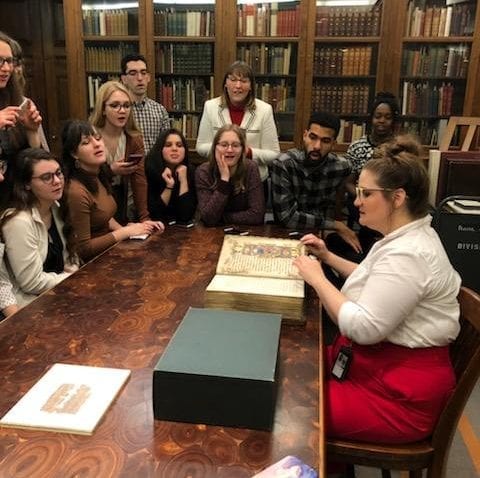On the morning of January 11, we attended a rare books presentation at the Library of Congress. The Library of Congress is the largest library in the world, with approximately 168 million items in their collections. The Library functions primarily as the research wing of Congress, and keeps serving elected officials in their policy research as a priority. However, it is also open to the public, and serves as a metaphorical crown jewel of libraries. It is both the oldest, and one of the widest reaching federal cultural institutions.
On our trip to the Library of Congress, we had the opportunity to sit down with Stephanie Stillo, the curator of the Rosenwald Room and a member of the Rare Books Department. We looked at several incredible historical books and items including a piece of papyrus from around 2000 BCE, a Mayan chocolate vessel, a 13th century Lectionary, and George Washington’s journal. Getting to see these items was an awe-inspiring experience, and moved me more than I would have expected. It’s an incredible thing to be able to hold a very old item and think about all the people who made, used, and loved that item in distant times. It becomes even more incredible when you consider all the similar objects that have been lost, and all the work that went into bringing them to be in this library in 2020. Holding an object that once belonged to someone is a powerful reminder of the fact that people have lived lives as vivid as our own in every era, and that examining these objects brings us somewhat closer to them, but can’t ever fully bring someone out of the depths of history.
We were told by Stephanie Stillo that most of the objects that survive and are recovered belonged to the richest members of society because they tended to be able to afford more durable materials, and have the resources to store objects in ways that are more recoverable. This means that rare books collections, and many historical collections in general have a significant bias towards displaying rich lives, and not the average life in a given society. This complicates many notions of historical knowledge, and the knowledge we can actually gain through these collections alone. While it is not unhelpful to know about the lives of the upper classes in history, it does not present a complete picture of a time period, or show us what everyday life was like for the vast majority of people. It is of course, not through any fault or bias of historians that collections skew rich, but it does present an interesting parallel to democracies. We often assume that because the record of policies and laws we have is representative of the beliefs of the average person in the time that they were created. But in reality, we know that American democracy has always favored wealth either explicitly through granting the vote only to landowners, or implicitly through relying on things like the ability of citizens to physically get to their precincts, and be able to afford the work flexibility to vote in the middle of the day on a Tuesday. In the same way, when we look at historical objects that belonged to the richest members of society who had access to those items, we may incorrectly assume that they represent the average person’s experience. It is important to know what an object can tell us about history, but it is equally important to know what an object does not tell us about history.
This is one of the reasons that it is of vital importance that the Rare Books Collection is housed within a much larger agency that provides public access to the largest collection of resources currently existing. In order for both democracy and the arts to work, we need to know what context and ideas we might be lacking and have the ability to seek out more information. The Library of Congress is important because it provides access to information about practically every topic to both the most powerful and the least powerful in the US, and allows for everyone to define and inform their own thoughts and practices. The importance of libraries cannot be overstated. Stephanie Stillo described the perspective of the library on political matters as “fiercely neutral”. This perspective is of great importance to any informational tool in a democracy. The Library of Congress defines the country and its democracy by not defining it, and by instead providing the resources for individuals to determine for themselves what their identities and values are.

A portrait of awe as the students are shown the illuminated text of a 13th century lectionary
